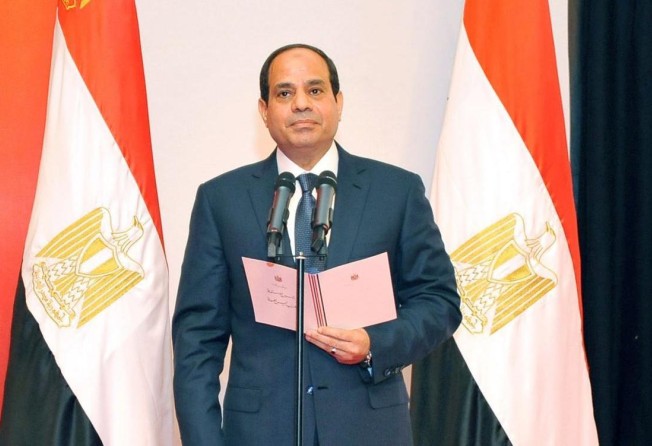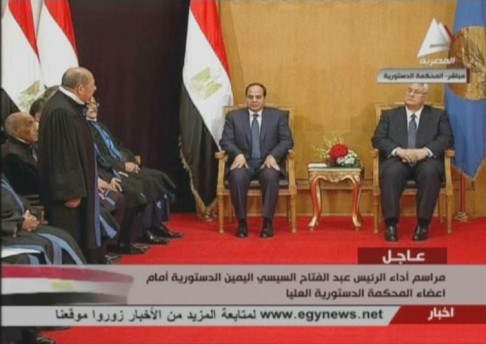Sisi sworn in as Egypt’s president
Western allies show lukewarm support for former army chief following low turnout at national election as weary Egyptians hope for stability

Former army chief Abdel-Fattah el-Sisi was sworn in as president of Egypt yesterday in a ceremony with low-key attendance by Western allies concerned by a crackdown on dissent since he ousted Islamist leader Mohammed Mursi last year.
Last month's election, which officials said Sisi won with 97 per cent of the vote, followed three years of upheaval since a popular uprising ended 30 years of rule by former air force commander Hosni Mubarak.
Watch: Army boss Sisi sworn in as Egypt president
Security in Cairo was extra tight, with armoured personnel carriers and tanks positioned in strategic locations as Sisi swore to protect Egypt's unity, law and the interests of its people before the Supreme Constitutional Court.
He called for hard work and the development of freedom "in a responsible framework away from chaos" but did not mention human rights or democracy.
"The time has come to build a more stable future," said Sisi, the sixth Egyptian leader with a military background. "Let us work to establish the values of rightness and peace."
Near Tahrir Square, the symbolic heart of the revolt against Mubarak where protesters now rarely tread, young men sold T-shirts with the image of Sisi in his trademark dark sunglasses.
Media commentators heaped praise on him, turning a blind eye to what human rights groups say are widespread abuses, in the hope that he can deliver stability and rescue the economy.
Many Egyptians share that hope, but they have limited patience, staging street protests that toppled two leaders in the past three years. The election turnout of just 47 per cent shows Sisi is not as popular as when he toppled Mursi.
"Sisi has to do something in his first 100 days; people will watch closely and there might be another revolution. That's what people are like in this country," said theology student Israa Youssef, 21.
Western countries, which hoped the overthrow of Mubarak in 2011 would usher in a new era of democracy, have watched Egypt stumble politically.
Mursi was the country's first freely elected president, but his year-long tenure was tarnished by accusations that he usurped power, imposed the Muslim Brotherhood's views on Islam and mismanaged the economy - allegations he denied.
After Sisi deposed him and became Egypt's de facto ruler, security forces mounted a tough crackdown on the Brotherhood. Hundreds were killed in street protests and thousands more thrown in jail.
Secular activists were eventually jailed too, even those who supported Mursi's fall, because they violated a new law that severely restricts protests.
Mursi's ousting was applauded by Egypt's Gulf Arab allies, who were alarmed by the rise of the Brotherhood, the international standard-bearer of mainstream Sunni political Islam. The movement, which won nearly every election in Egypt since Mubarak's fall, is seen as a threat to Gulf dynasties.
King Abdullah of Saudi Arabia urged Egyptians last week to back Sisi. Kuwait's emir, the king of Bahrain, and the crown princes of Saudi Arabia and Abu Dhabi attended the inauguration, according to a list provided by the Egyptian presidency.
In contrast, the United States only sent a senior adviser to Secretary of State John Kerry and most European countries only planned to send ambassadors.
"Just having ambassadors shows very clearly that while the governments are recognising the new transfer of power they are certainly not doing so with a huge amount of enthusiasm," said H.A. Hellyer, a non-resident fellow at the Brookings Institution in Washington.
"It won't mean much in terms of trade and cooperation, but it leaves a bit of a foul taste in people's mouths."
